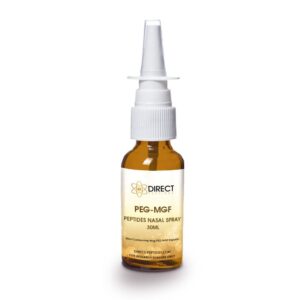Buy PEG-MGF Peptide Lithuania
Buy PEG-MGF (Pegylated Mechano Growth Factor), a synthetic peptide based on IGF-1. It helps with muscle repair and regeneration by promoting the growth and fusion of muscle cells, while also reducing inflammation and oxidative stress.
Shop our Full Range of PEG-MGF Peptides
-
Sale!
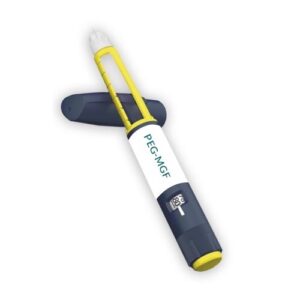
PEG-MGF Pre-Mixed Pen 2mg
£29.58 – £79.87Price range: £29.58 through £79.87 This product has multiple variants. The options may be chosen on the product page -
Sale!
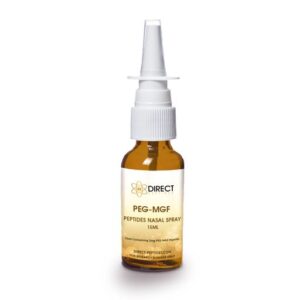
PEG-MGF Nasal Spray
£35.00 – £65.00Price range: £35.00 through £65.00 This product has multiple variants. The options may be chosen on the product page -
Sale!
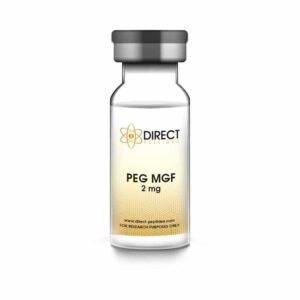
PEG-MGF Peptide Vial
£27.00 – £35.98Price range: £27.00 through £35.98 This product has multiple variants. The options may be chosen on the product page
What Is PEG-MGF?
PEG-MGF, or Pegylated Mechano Growth Factor, is a variant of Insulin-Like Growth Factor 1 (IGF-1) designed to enhance muscle repair and regeneration. By incorporating the pegylation process, this peptide achieves increased stability and a longer half-life within the body, making it more effective for sustained therapeutic applications.
Lithuania Researchers are particularly interested in PEG-MGF due to its ability to stimulate the activation and proliferation of muscle satellite cells, which are crucial for muscle growth and repair.
Furthermore, it has been shown to help reduce muscle inflammation and lessen oxidative stress, both of which are critical factors in skeletal muscle injury recovery. These properties make PEG MGF peptide a valuable tool for studying muscle development, regeneration, and its potential therapeutic applications in muscle-related diseases or conditions.
PEG-MGF Mechanism Of Action
PEG-MGF works by activating muscle satellite cells, which are essential for muscle repair and regeneration. When muscles are damaged or stressed, PEG-MGF prompts these cells to multiply and develop into mature muscle fibers, helping to repair and strengthen the tissue.
The pegylation process increases the peptide’s half-life, keeping it active in the bloodstream longer and improving its effectiveness. PEG-MGF also influences gene expression related to muscle growth and helps balance muscle building (anabolism) and breakdown (catabolism). This makes it an important area of research for treating muscle degeneration, sports injuries, and muscle-wasting conditions.
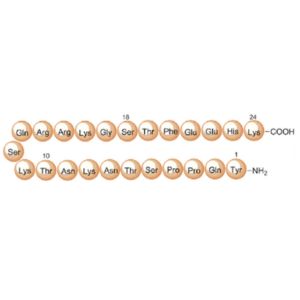
Structure of PEG-MGF
Sequence: H-Tyr-Gln-Pro-Pro-Ser-Thr-Asn-Lys-Asn-Thr-Lys-Ser-Gln-Arg-Arg-Lys-Gly-Ser-Thr-Phe-Glu-Glu-His-Lys-NH2
Molecular Formula: C121H200N42O39
Molecular Weight: 2888.16
What Are The Research Benefits of PEG-MGF
Muscle Structure: Muscle resistance activity significantly activates MGF mRNA expression in muscle tissues, with studies showing up to a 456% increase during resistance exercises. This up-regulation, linked to mechanical stimuli, coincides with elevated growth hormone levels, which alone contribute to an 80% rise in MGF mRNA. Researchers propose this reflects enhanced transcription of the IGF-I gene prior to splicing. Further insights from muscle cell cultures reveal the role of MGF in muscle formation, influencing muscle cell size and chondrocyte migration, highlighting its critical function in tissue repair and adaptation to mechanical stress [1].
Muscle Injury: Skeletal muscle injuries are common in sports medicine, with macrophages playing a vital role in muscle regeneration. Research into mechano growth factor (MGF) has shown it may mitigate the effects of macrophage depletion on muscle healing. While MGF injections did not enhance muscle fibre regeneration, they reduced fibrosis, inflammation, oxidative stress, and chemokine expression in injured muscles [2].
It was also observed that MGF may suppress collagen types I and III, inflammatory cytokines (e.g., TNF-α, IL-1β), chemokines, and oxidative stress markers, which are key contributors to fibrosis and inflammation. Collagens play a key role in fibrotic processes, while reduced oxidative stress markers and matrix metalloproteinases (MMPs) suggest MGF may help alleviate inflammation linked to muscle injury. Although MGF showed limited impact on satellite cell function essential for regeneration, it appears to help modulate the inflammatory environment and oxidative stress, aiding muscle recovery [3].
Muscle Tissue Hypertrophy: A study on MGF examined its effects on muscle cells of different ages. In younger cells, MGF delayed cellular aging and enhanced cell proliferation, promoting muscle regeneration. While older cells did not show increased proliferation, they experienced muscle hypertrophy with larger cell size. MGF also enhanced myotube formation and size across all age groups, potentially improving muscle functionality. However, it reduced the number of reserve cells, suggesting it encourages active participation in muscle repair. Overall, the study highlights MGF’s potential to activate, proliferate, and fuse satellite cells for muscle maintenance and repair [4].
Bone Repair: This study examined the effects of MGF on bone healing in rabbits with 5-mm bone defects. MGF-treated tissues showed significantly better healing compared to controls and those treated with IGF-1. Findings suggest that MGF may enhance bone repair by influencing the cell cycle and activating the MAPK-Erk1/2 signaling pathway, highlighting its potential as a targeted strategy for improving bone regeneration [5].
Heart Protection: This study evaluated the effects of MGF on cardiac muscle cells undergoing apoptosis due to hypoxia. In rat models with 1% oxygen supply, MGF appeared to enhance the migration of mesenchymal stem cells (hMSCs) to the heart, potentially inhibiting apoptosis. Increased Bcl-2 gene levels suggest MGF may support cell survival and tissue regeneration by preventing programmed cell death, highlighting its potential for therapeutic applications [6].
Neuroprotection: Studies on mice investigated the effects of increased MGF levels on brain cells. In one study, mice were bred to overproduce MGF in the hippocampus, leading to higher concentrations of BrdU, a marker of cell proliferation [7]. Another study induced conditional MGF production at different ages, with results showing elevated BrdU levels and increased neurogenesis after 2 years [8].
Buy PEG-MGF peptide Lithuania for research purposes online today!
Buy PEG-MGF Pre-Mixed Pen
Buy the PEG-MGF pre-mixed 2 mg pen for a convenient, ready-to-use system. It eliminates reconstitution, ensures precise dosing, and is portable—perfect for consistent, accurate use in research.
The Pre-Mixed Cartridge and Kit includes a premixed peptide cartridge, pen, carry case, and 3 needle tips. Single cartridges (1, 2, or 3) come premixed with 3 needle tips but no kit. Save 10% when purchasing 3 cartridges.
Buy PEG-MGF Peptide Nasal Spray
Buy PEG-MGF peptide nasal spray, designed for ease and convenience. Available in 15 ml and 30 ml bottles, it offers a non-invasive option for research. This method ensures effective absorption through the nasal mucosa, providing a simple, efficient system.
The two bottle sizes offer flexibility for different research needs. Ideal for cases where injections aren’t suitable, the spray maintains stability and potency for reliable results.
Frequently Asked Questions (FAQs) about PEG-MGF
Why is the pegylation process important?
Pegylation refers to adding a polyethylene glycol (PEG) structure to the peptide. This process increases the peptide’s stability, extends its half-life, and enhances its overall effectiveness in research applications.
How should PEG-MGF peptide be stored?
For optimal stability and performance, it is recommended to store PEG-MGF peptide in a cool, dry place. Specific storage instructions are provided with the product to ensure its integrity is maintained over time.
What are the reported side effects of PEG-MGF?
While PEG-MGF is primarily used for scientific research, some studies and anecdotal reports have highlighted potential side effects associated with its use. These may include mild irritation or redness at the site of injection, muscle pain, or swelling. It is important to note that the safety profile of PEG MGF is not fully understood, and its use outside of a controlled research environment is not recommended. Researchers should exercise caution and follow all safety protocols when handling this peptide.
Can PEG-MGF help heal tendons?
Research into PEG-MGF suggests it may promote muscle growth and cellular repair, sparking interest in its potential for tendon healing. Some studies show MGF derivatives, including PEG-MGF, can stimulate tissue repair in certain conditions. However, the exact mechanisms and effectiveness in tendon healing remain unclear. It’s important to note PEG-MGF is not approved for therapeutic use and should only be used in controlled scientific studies. Further studies are needed to understand its effects and potential applications.
Is PEG-MGF legal?
The legal status varies by country and jurisdiction. In the United States, it is not approved by the FDA (Food and Drug Administration) for human consumption or therapeutic use. It is classified as a research chemical and is typically only available to licensed researchers for laboratory studies. Similarly, in other regions, its use is restricted to scientific research, and the sale, purchase, or usage of the peptide outside of these contexts may breach local laws and regulations. Individuals considering its use should carefully evaluate the legal implications and ensure they are fully compliant with applicable laws.
Buy PEG-MGF Peptide Lithuania for research use from Direct Peptides today!
Summary of Research Applications
- Enhance muscle mass and repair.
- Improves muscle function.
- Reduce recovery time and improve endurance.
- Accelerate bone healing.
- Support cognitive health.
- Help prevent heart disease.
- Reduce the risk of stroke.
Buy PEG-MGF Peptide Vial, available in 2 mg lyophilized powder. Before use the peptide needs to be reconstituted with bacteriostatic water.
PEG-MGF Peptide Quality Assured
Buy PEG-MGF peptide with 99% purity from Direct Peptides, designed for scientific research. Our products are tested thoroughly to ensure quality and reliability, giving researchers confidence in their work. Trust our peptides for safety, accuracy, and consistent performance in your research.
References For Further Reading
[1] M Hameed, K H W Lange, J L Andersen, P Schjerling, et al (2003) The effect of recombinant human growth hormone and resistance training on IGF-I mRNA expression in the muscles of elderly men – Journal of Physiology, 2003 Oct 18, Volume 555 (Pt 1), Pages 231–240.
[2] X Liu, Z Zeng, L Zhao, P Chen, and W Xiao (2019) Impaired Skeletal Muscle Regeneration Induced by Macrophage Depletion Could Be Partly Ameliorated by MGF Injection – Frontiers in Physiology, 2019 May 17, Volume 10, Page 601.
[3] Keng-Ting Sun, Kwok-Kuen Cheung, Shannon W N Au, Simon S Yeung, and Ella W Yeung (2018) Overexpression of Mechano-Growth Factor Modulates Inflammatory Cytokine Expression and Macrophage Resolution in Skeletal Muscle Injury – Frontiers in Physiology, 2018 Jul 26, Volume 9, Page 999.
[4] Prashanth Kumar Kandalla, Geoffrey Goldspink, Gillian Butler-Browne, and Vincent Mouly (2011) Mechano Growth Factor E peptide (MGF-E), derived from an isoform of IGF-1, activates human muscle progenitor cells and induces an increase in their fusion potential at different ages – Mechanisms of Ageing and Development, 2011 Apr, Volume 132 (Issue 4), Pages 154-62.
[5] Moyuan Deng 1, Bingbing Zhang, Ke Wang, Feng Liu, et al (2010) Mechano growth factor E peptide promotes osteoblasts proliferation and bone-defect healing in rabbits – International Orthopaedics, 2010 Nov 6, Volume 35 (Issue 7), Pages 1099–1106.
[6] Golnar Doroudian, James Pinney, Perla Ayala, Tamara Los, et al (2014) Sustained delivery of MGF peptide from microrods attracts stem cells and reduces apoptosis of myocytes – Biomedical Microdevices, 2014 Oct, Volume 16 (Issue 5), Pages 705–715.
[7] Jason J Tang, Jewel L Podratz, Miranda Lange, Heidi J Scrable, et al (2017) Mechano growth factor, a splice variant of IGF-1, promotes neurogenesis in the aging mouse brain – Molecular Brain, 2017 Jul 7, Volume 10, Page 23.
[8] Jason J Tang, Jewel L Podratz, Miranda Lange, Heidi J Scrable, et al (2017) Mechano growth factor, a splice variant of IGF-1, promotes neurogenesis in the aging mouse brain – Molecular Brain, 2017 Jul 7, Volume 10 (Issue 1), Page 23.
Why Choose Direct Peptides Lithuania?
Buy PEG-MGF peptide Lithuania today from Direct Peptides, your trusted source for high-quality peptides. We provide a range of options to suit your needs, including 2 mg peptide vials, ready-to-use 2 mg peptide pens, and nasal sprays available in 15 ml and 30 ml sizes. Our products are designed to support a variety of research requirements, offering precise formulations essential for your studies. Store compounds in a cool, dark place, as exposure to UVC rays can damage the peptide.
ALL CONTENT AND PRODUCT INFORMATION AVAILABLE ON THIS WEBSITE IS FOR EDUCATIONAL PURPOSES ONLY.
DISCLAIMER: These products are intended solely as a research chemical only. This classification allows for their use only for research development and laboratory studies. The information available on our Lithuania Direct Peptides website: https://direct-peptides.com is provided for educational purposes only. These products are not for human or animal use or consumption in any manner. Handling of these products should be limited to suitably qualified professionals. They are not to be classified as a drug, food, cosmetic, or medicinal product and must not be mislabelled or used as such.
Related Posts

Comparing MGF and PEG-MGF For Effective Muscle Growth
This blog compares MGF and PEG-MGF, two peptides essential for muscle repair and regeneration. MGF activates satellite cells immediately after muscle damage, while PEG-MGF sustains the process due to its longer half-life. The blog also explores their unique benefits, applications, and comparisons to other growth factors like IGF-1 LR3 and HGH191aa, offering researchers insights into muscle growth and recovery solutions.

How Pegylated MGF Reduces Cortisol & Boosts Muscle Recovery
This blog examines the potential of Pegylated Mechano Growth Factor (PEG-MGF) in reducing cortisol levels, aiding muscle recovery, and managing stress. Cortisol, the "stress hormone," can hinder recovery and cause muscle breakdown when elevated. PEG-MGF, a research peptide, shows promise in supporting muscle regeneration, preserving lean mass, and counteracting cortisol's negative effects.

